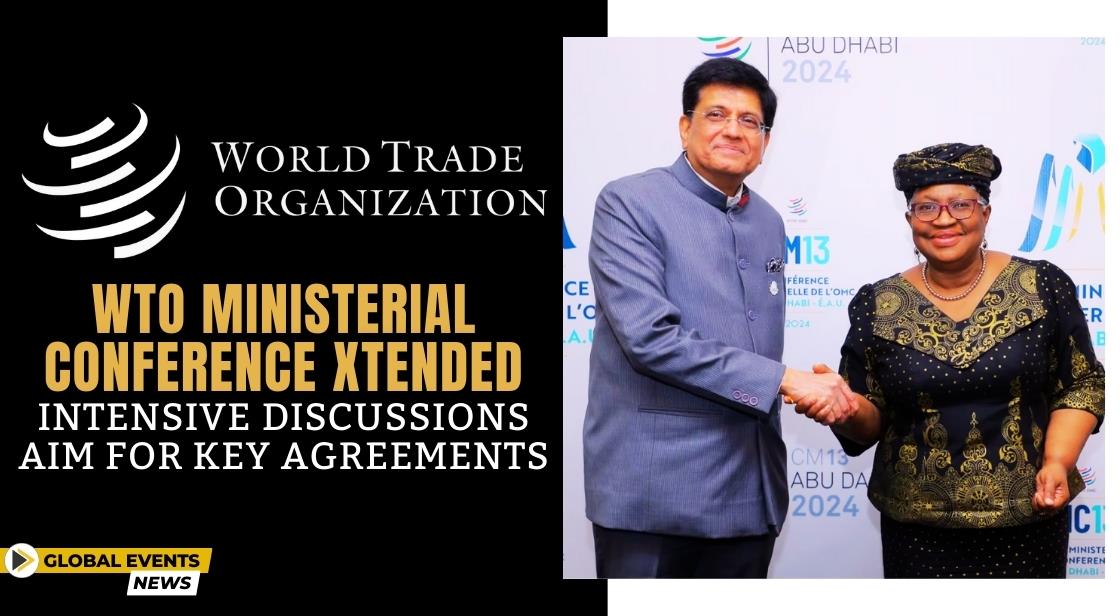WTO Ministerial Conference Extended: Intensive Discussions Aim for Key Agreements

News Synopsis
The 13th Ministerial Conference of the World Trade Organization (WTO) in Abu Dhabi has been granted an extension until Friday, March 1st, facilitating further deliberations and potential breakthroughs on significant issues. This extension responds to collaborative discussions between the Director-General, the Chair, and Minister Facilitators, demonstrating a collective commitment to addressing pressing global trade concerns.
The decision to extend the conference comes in the wake of the Director-General's call for member countries to actively engage in finding solutions during the ongoing negotiations. The initial closing date of February 29th has been rescheduled, providing extra time to make substantial progress.
India's Push for WTO Trust Rebuilding: Urgent Appeals for Appellate Body Restoration
India's Commerce Minister, Piyush Goyal, emphasized the critical need for rebuilding trust within the WTO and ensuring the effective implementation of its decisions during the 13th Ministerial Conference in Abu Dhabi. A central focus of Minister Goyal's address was the urgent restoration of the appellate body, dormant since December 2019, seen as pivotal in upholding the rules-based global trade order.
The non-functionality of the appellate body, mainly due to the United States blocking member appointments, has cast doubts on the credibility of the WTO's ability to resolve trade disputes. Minister Goyal reiterated India's stance on the necessity of a robust dispute settlement system, crucial for maintaining fairness, predictability, and effectiveness in international trade.
India recalled the commitment made by WTO members at the 12th Ministerial Conference to conduct discussions aiming for a fully functional dispute settlement system accessible to all members by 2024. Minister Goyal emphasized that a credible and reliable WTO dispute settlement system is fundamental for an equitable, effective, secure, and predictable multilateral trading system. The restoration of the appellate body remains a top priority for India in any reform process.
India Emphasizes Restoring Trust and Fair Trade Practices
India's Commerce Minister, Piyush Goyal, highlighted the urgent need for the WTO to:
-
Rebuild trust among member countries.
-
Ensure the effective implementation of its decisions.
-
Restore the Appellate Body, which has been inactive since December 2019.
India reiterated its stance on the need for a robust dispute settlement system to maintain:
-
Fairness
-
Predictability
-
Effectiveness in international trade.
India also recalled the commitment of WTO members at the 12th Ministerial Conference to establish a fully functional dispute settlement system accessible to all members by 2024. Additionally, India emphasized its long-standing position that a credible and reliable WTO dispute settlement system is essential for an equitable, effective, secure, and predictable multilateral trading system.
The minister further emphasized that any reform process outcome should prioritize restoring the Appellate Body, which remains a top priority for India. Additionally, he highlighted India's commitment to principles of fair play and justice, ensuring that all WTO decisions prioritize the best interests of Indian farmers and fisherfolk.
India Blocks Key China-Led Proposal
India, along with South Africa, successfully blocked a key proposal led by China at the WTO on the conference's third day. The proposal, known as the Investment Facilitation Development Agreement (IFDA), is unlikely to be included in the final outcome document of the ongoing ministerial conference.
India raised several concerns regarding the IFDA:
-
Scope: India argued that the IFDA falls outside the WTO's purview as it's not strictly a trade issue within the scope of the Marrakesh Agreement.
-
Lack of Consensus: India pointed out that the IFDA doesn't fulfill the criteria for a formal agreement as it hasn't received unanimous support from all WTO members, lacking the required consensus.
This is not the first time India has voiced its opposition to the IFDA. The country previously blocked the proposal in December 2023 and at the WTO's General Council Meeting. India's consistent stance highlights its concerns surrounding the agreement's potential impact.
You May Like









